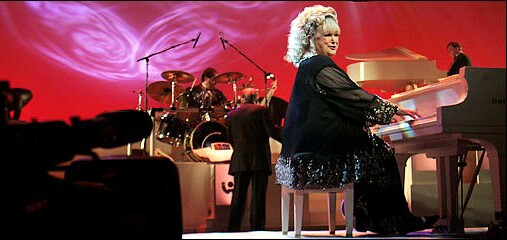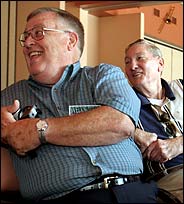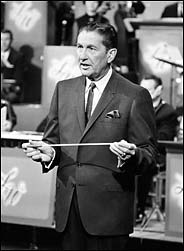 |
 |
 |
Old Fans Still Bubble Along to Lawrence Welk
By JOHN LELAND
Published: September 11, 2004
RELATED
SITES
welknotes.com
(The photos that appeared with the article are shown below)
 |
 |
 |
BRANSON, Mo. - Lawrence Welk disappeared from commercial television 20 years ago, but Alice Hutchinson, 84, will watch a rerun of his show on Saturday night, as she does every week. She will tape it and make copies for friends. She will chat about it for hours online.
And she will not be alone. Twelve years after Welk's death, "The Lawrence Welk Show" is the highest-rated syndicated show on public television, reaching an audience of more than three million households. His viewers outnumber those for MTV, VH1 and BET on Saturday nights.
Defying a half-century of cultural momentum, they are the counterculture that time forgot.
"I don't watch much TV because it doesn't interest me," said Ms. Hutchinson, who came here as she does every year, to see members of the Welk cast perform onstage. "I had to learn to tolerate rock and roll because I had teenagers, but the kind of music Lawrence Welk plays, you never get tired of it."
That music, which was considered square even in its heyday, is not so much back as it is unexpungeable, a vein of American taste that survives despite the best efforts of critics, television programmers and cultural gatekeepers. It has outlasted the Twist, the New Look, the 1970's, the 1970's revival and the Macarena, to say nothing of the vogue for all things crunk.
On Sept. 2 and 3, 15 members of the Welk television cast taped a PBS fund-raising special that will commemorate the 50th anniversary of Welk's first series. For the Internet discussion group welknotes.com, it was an occasion.
Ms. Hutchinson wore a gray dress and attended three tapings at the Welk Resort Champagne Theater, which stages live performances of a Welk show here. Her immersion in the Welk nation began four years ago when she got WebTV for her 80th birthday. This was also the day her husband died.
"It really changed my life," she said of the show's online community. "After retirement, my life had come to a screeching halt. But Lawrence Welk encourages us old people because he didn't get famous until he was old enough for Social Security, so it shows that there's life after midlife."
Welk owes his unlikely legs to a legacy of both resilience and opportunism. ABC dropped his series in 1971, though it had high ratings, and Welk began syndicating it himself, selling it to stations individually.
In 1987, after Welk had retired and the show had fallen off the air, Robert L. Allen, executive director of the Oklahoma Educational Television Authority, acquired the rights to syndicate reruns to public television stations. At first, Mr. Allen said, station executives were dubious. "People thought his accent was corny," Mr. Allen said, recalling Welk's German-inflected speech.
But Welk's aging constituency, Mr. Allen said, was suited for public television. "Commercial stations don't want the older demographic because they're set in their preferences, so they won't change their toothpaste." But they are also more likely to donate money to support their interests, he said. "And once they make a pledge, they fulfill it. They're very loyal."
Once the audience started to emerge, Mr. Allen said, he learned something about the nature of public television. "We always felt we were serving an older demographic, but we had no idea how big until we put up 'The Lawrence Welk Show.' "
Reruns of the weekly TV show - more than 1,000 episodes were taped - now run on 279 public television stations, along with new interviews with the cast. Ratings are highest in retirement areas.
Each year, the cast produces a fund-raising special that ranks among the top earners for PBS, drawing more than $30 million since 1987. Even during the recent stock-market plunge, when many retirees lost much of their nest eggs, "there was no blip in pledges" from Welk fans, Mr. Allen said.
At the gathering in Missouri, Verda Campbell, 69, read a poem that began, "Branson, here we come." Ms. Campbell wore a denim dress with a large American flag on the chest. Her passions are Welk and sewing - both of which she discusses avidly online - and she had hoped to embroider musical staves for each Welknotes member, but ran out of time after about 70. Anyone left out, she said, could e-mail her if they wanted one.
Like many of the assembled, she remembered watching the show with her parents or grandparents, and was now trying to indoctrinate her grandchildren. This was her first Welknotes gathering, but she felt she knew everyone already.
" 'Lawrence Welk' is the only good show that's ever been on," she said, with a certainty that was characteristic of the group. "We're trying to tell all the little kids how important this is. There's not another clean show. All I watch is the news, which isn't good now."
She added that her husband, Ron, who accompanied her on the trip from Florida, did not always share this sentiment, but that there was a time and place for his viewpoint, and this was not either.
"My husband is the best clicker in the world," she told her new friends, referring to the manly penchant for the remote control. "But he knows on Saturday night, if he dares touch that clicker, it's all over."
Eleanor Price, who at 32 is much younger than most members, described a different family dynamic. She did not grow up watching Welk on the family TV set. "Even my parents say he's unhip," said Ms. Price, who works as a legal assistant in Austin, Tex.
But Ms. Price got hooked by the interviews with the cast members that accompany each rerun. She began to see Welk as "an icon of fringe, wholesome nerdiness," and started to attend concerts by cast members.
"I like the perseverance, that they continue to perform, even if it's in high school gymnasiums or senior expos, after they had been huge stars," she said.
Like the audience, the cast members have had their retirement years transformed by the show's unexpected longevity. Norma Zimmer, 81, who became Welk's "Champagne lady," or featured singer, in 1960, said she had expected to retire long ago, but the annual fund-raising specials brought her back. "I was ready to stay home and ski," she said.
But she said she enjoyed watching the show in reruns now, because she had often been busy performing when it ran originally. And she felt it still had a purpose. "I love this Josh Groban, but clean entertainment is missing," she said. "I'm embarrassed by things I see in prime time. We've got to get back to the Ten Commandments."
Yet all is not bubbles in the Welk world. After this season, the Welk Resort Champagne Theater will replace the Welk stage show with more modern acts. "It's been 11 years," said Larry Welk, 64, who now oversees his father's empire. "We need something that will draw a broader audience for a long run."
For Terry Lewis, 59, a retired nuclear worker from Oak Ridge, Tenn., the news seemed one more gloomy prediction that might or might not come true. Ms. Lewis described herself as a "semi" Welk fan, meaning that she goes to about six Welk shows a year, but does not participate on Welknotes.com. Mainly, she said, she attends to be with her mother, Ms. Hutchinson.
"This has filled a void in her life," Ms. Lewis said. "After my dad died, for a while there she was so angry that my dad left her alone. This helped her over that."
For Ms. Hutchinson, the show was a success. Each taping included 30 songs, and after each song the audience gave a standing ovation.
"Oh, no, we don't get tired," said Ms. Hutchinson, who has had replacement surgery on both knees.
She promised to dance with one of the cast members, who returned her greeting as if they were old friends.
"I would like to be younger and thinner," Ms. Hutchinson said, "but my life is better than ever - especially since I got my new knees."
 |